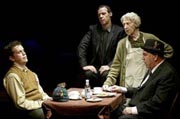
ROBERT HICKS
The role memory plays in Irish playwright Bian Friel’s
1964 comedy
“Philadelphia, Here I Come!”
 |
| 'Philadelphia, Here I Come,' Michael FitzGerald, James Kennedy, Paddy Croft,Edwin C. Owens, photo Carol Rosegg |
The Irish Repertory Theatre, 132 West 22nd Street
Tues.-Sun. 8:00 pm; Sat.-Sun. 2:00 pm
$45 and $50
(212) 727-2737 or at the box office.
Closes Sept. 25, 2005
Reviewed by Robert Hicks on Tues., Aug. 9, 2005
Ireland’s leading contemporary playwright Brian Friel possessed remarkable charm in revealing the humor and pain in his characters who reside in the small village of Ballybeg, County Donegal in his groundbreaking 1964 comedy “Philadelphia, Here I Come!,” revived under Ciaran O’Reilly’s capable direction at The Irish Repertory Theatre through Sept. 25.
With profound insight into the breakdown of familial communication and the role memory plays in reconstructing life, Friel tells the story of Gareth O’Donnell, a young, ambitious Irishman preparing to leave his homeland for hotel work in Philadelphia.
The 25-year-old O’Donnell longs to free himself from dull work in his father’s dry-goods shop and to find tenderness, reassurance and love that he never has received from his taciturn father S. B. O’Donnell.
Friel gives voice to Gareth’s struggle for identity through his public self (Michael FitzGerald) and his public self (James Kennedy). Gar’s ebullient private self provides insight into the young man’s past and his dreams for the future. He desires attention from his silent, predictable father, yet he angrily mocks his father’s lack of etiquette, predictable behavior and poor command of language.
Gar’s public self longs to escape his father’s silence, his own lost love in the figure of Kate Doogan (Tessa Klein) and the painful loss of his mother, Maura, by emigrating to America. He lacked the strength and conviction to ask stern Senator Doogan (Gil Rogers) for his daughter Kate’s hand in marriage and her father’s low regard for him forced her to marry an older man, Francis King. Both Gar and his father have lost something dear to them as a result of their reticence and failure to connect emotionally to those whom they love.
Gar is also haunted by the loss of his mother, who died three days after his birth, and he envies the warmth and courage of his surrogate mother and his father’s housekeeper, Madge (Paddy Croft).
Master Boyle (James A Stephens) is a school headmaster who is about to lose his job. Like Gareth, he lost the woman of his dreams through a failure to communicate his love. It’s ironic that Garth’s own reticence in failing to ask for Kate’s hand in marriage ultimately has caused him much loss and pain in his life. Master Boyle also has ambitions for his real or imaginary future. He encourages Gar to leave Ireland and become 100% American.
Despite Gar’s restless ambition and confused past, he still harbors a strong attachment to his father and Ireland. Through his confused memory of a fishing boat trip with his father, he attempts to recall a time when his father expressed his emotions through song and displayed happiness. S. B. O”Donnell can’t recall the fishing boat trip or whether he sang a happy song. For Gareth, that day was a beautiful experience, but now he is haunted by his callow inner voice that mocks him, telling him that memory is all he has now in life. Gar’s memory is flawed though. He really can’t know whether that fishing trip with his father was imaginary or real.
Gar’s aunt Lizzy Sweeney (Helena Carroll) offers comic relief to our experience of his painful loss and his inability to escape the troubled and fanciful memories of his past. Lizzy, Maura’s sister in Philadelphia, is forgetful and constantly has to be corrected about the facts of past events by her husband, Con Sweeney (John Leighton).
Friel shows us the unreliability of memory in reconstructing life whether it is humorous forgetfulness or the uncertainty of one’s ability to distinguish between imagination and reality. He also reveals there will always be an emotional distance between Gareth and his father whether or not a physical distance between father and son will ever materialize when Gareth arrives in Philadelphia.
At the end of the play, Gareth’s inner self asks, “Why do you have to leave?” To which his public self replies with uncertainty: “I don’t know.”
Gareth’s unreliable memory and his failed convictions cast uncertainty on his ability to distinguish between imagination and reality and undermine his efforts to merge his private and public voices into a confidant sense of self-identity. [Hicks]
| museums | NYTW mail | recordings | coupons | classified |
